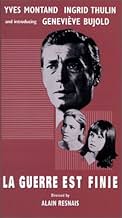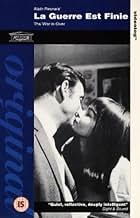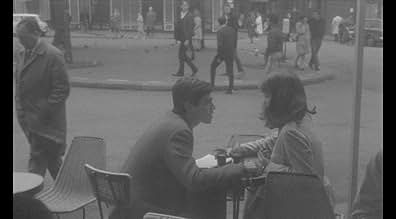La guerre est finie
- 1966
- Tous publics
- 2h 1m
IMDb RATING
7.3/10
2.6K
YOUR RATING
A veteran Republican fighter's ardent dedication to overthrow of Franco's regime is challenged. He realizes that the center of political struggle has shifted away from him, and is forced to ... Read allA veteran Republican fighter's ardent dedication to overthrow of Franco's regime is challenged. He realizes that the center of political struggle has shifted away from him, and is forced to make choices about his life and political ideals.A veteran Republican fighter's ardent dedication to overthrow of Franco's regime is challenged. He realizes that the center of political struggle has shifted away from him, and is forced to make choices about his life and political ideals.
- Nominated for 1 Oscar
- 4 wins & 4 nominations total
- Director
- Writer
- All cast & crew
- Production, box office & more at IMDbPro
Featured reviews
Resnais really impressed me with this film. He uses real locations and finds subtle atmospheric things that almost never turn up in movies. One sees the way a shadow of a tree moves gently back and forth on the wall as two people relax in bed, the way a gust of wind briefly animates a woman's hair in a subway tunnel.
The movie successfully combines an account of resistance to Franco's Spain from an ex-patriot living in Paris (played by Montand), and his life outside of politics. We see not only his political views, but also how he feels about love and his own situation. Beautiful, brave and innovative, this movie also has some of the most passionate, yet restrained and overall fascinating love scenes that I have seen since Peter Sellers and Shirley Maclaine in 'Being There.'
The movie successfully combines an account of resistance to Franco's Spain from an ex-patriot living in Paris (played by Montand), and his life outside of politics. We see not only his political views, but also how he feels about love and his own situation. Beautiful, brave and innovative, this movie also has some of the most passionate, yet restrained and overall fascinating love scenes that I have seen since Peter Sellers and Shirley Maclaine in 'Being There.'
10hhs-3
CAUTION: NOTES ON PLOT INCLUDED
Well, if you think this movie is about hot sex and Franco, then you could stick to Hemingway. A stunning psychodrama about a man who has seen his life burned out after decades of fighting a "good" but hopeless war, recognizes the futility, and sees another generation committing itself to figurative and literal suicide. Does he stop them? Join them? Can he have any effect at all? Does he try? See the movie. If you're into political drama a la Frankenheimer, Zinnemann, or Costa Gavras, this one is a "ten."
But you're right about Genevieve Bujold. Are you ever 8-)
Well, if you think this movie is about hot sex and Franco, then you could stick to Hemingway. A stunning psychodrama about a man who has seen his life burned out after decades of fighting a "good" but hopeless war, recognizes the futility, and sees another generation committing itself to figurative and literal suicide. Does he stop them? Join them? Can he have any effect at all? Does he try? See the movie. If you're into political drama a la Frankenheimer, Zinnemann, or Costa Gavras, this one is a "ten."
But you're right about Genevieve Bujold. Are you ever 8-)
"Patience and irony are the chief virtues of a Bolshevik."
Beautifully shot, with splashes of visual flair, like the fast edits or the scenes with the exquisite shimmering of light on the ceiling, an echo of the haze of looking back on a life of an underground struggle against fascism in Spain following the Civil War. The film highlights the need for perseverance, brotherhood, and sacrifice over the long haul to achieve regime change, as well as the melancholy that comes from perceiving that at some point one's own personal "war" may be over, but the movement will continue on in younger hands.
I loved the idea of it, but unfortunately, the story is about as dry as toast, and it takes far too long to get to the most interesting bit, which was the old guard revolutionary (Yves Montand) confronted with newer radicals who disagree with him on tactics. I wish that part had been more developed. There is just too much time spent on mundane aspects beforehand, the details for which were rather muddled, to sustain a two hour film. Even the presence of Geneviève Bujold and Ingrid Thulin couldn't save it from being a dull affair, and how Resnais shot the love scene between Bujold and Montand in such a (nearly comical) artsy way didn't help matters. As an exercise in filmmaking and with these stars, it holds some level of interest, but it's hard to see how anyone could get excited over it. Seeing it once was enough.
Beautifully shot, with splashes of visual flair, like the fast edits or the scenes with the exquisite shimmering of light on the ceiling, an echo of the haze of looking back on a life of an underground struggle against fascism in Spain following the Civil War. The film highlights the need for perseverance, brotherhood, and sacrifice over the long haul to achieve regime change, as well as the melancholy that comes from perceiving that at some point one's own personal "war" may be over, but the movement will continue on in younger hands.
I loved the idea of it, but unfortunately, the story is about as dry as toast, and it takes far too long to get to the most interesting bit, which was the old guard revolutionary (Yves Montand) confronted with newer radicals who disagree with him on tactics. I wish that part had been more developed. There is just too much time spent on mundane aspects beforehand, the details for which were rather muddled, to sustain a two hour film. Even the presence of Geneviève Bujold and Ingrid Thulin couldn't save it from being a dull affair, and how Resnais shot the love scene between Bujold and Montand in such a (nearly comical) artsy way didn't help matters. As an exercise in filmmaking and with these stars, it holds some level of interest, but it's hard to see how anyone could get excited over it. Seeing it once was enough.
Alain Resnais was almost a god of cinema in the 60's. That people actually discussed the meaning of Last Year at Marienbad at parties seems unbelievable today (yet check the posts for Mulholland Drive), but it was a cultural object just as real as a Picasso painting. If I say that La Guerre est finie has aged badly, that's not to say that it didn't hold the attention of liberals 40 years ago.
The politics of the main (male) characters are fossilized. The old Bolshevik ideals have become more and more detached from reality. Diego knows that there will be no general strike in Spain on May 1st, no matter how hard they will it to happen. Pamphlets smuggled by car into the country in false compartments are not being translated into actions. Diego's lack of authenticity is his real problem: he's spent most of his life in France, speaks better French than Spanish, and is watching people 20 years younger than himself taking more radical steps to end Franco's rule.
Marianne has a greater grasp of reality than her lover. After nine years with Diego, she just wants to settle down and have kids, and put an end to the endless coded conversations with her friends (who are ignorant of Diego's revolutionary activities). She watches as Diego gets sloppy--driving with lights out while there's a suitcase full of plastic explosives in the car, as a cop stops them for questioning.
Semprun's script makes Montand into a sexual magnet; has any 20-year-old girl taken off her clothes faster for a tired 45-year-old man? The star system dictates that the male lead be a stud, but there are limits.
The politics of the main (male) characters are fossilized. The old Bolshevik ideals have become more and more detached from reality. Diego knows that there will be no general strike in Spain on May 1st, no matter how hard they will it to happen. Pamphlets smuggled by car into the country in false compartments are not being translated into actions. Diego's lack of authenticity is his real problem: he's spent most of his life in France, speaks better French than Spanish, and is watching people 20 years younger than himself taking more radical steps to end Franco's rule.
Marianne has a greater grasp of reality than her lover. After nine years with Diego, she just wants to settle down and have kids, and put an end to the endless coded conversations with her friends (who are ignorant of Diego's revolutionary activities). She watches as Diego gets sloppy--driving with lights out while there's a suitcase full of plastic explosives in the car, as a cop stops them for questioning.
Semprun's script makes Montand into a sexual magnet; has any 20-year-old girl taken off her clothes faster for a tired 45-year-old man? The star system dictates that the male lead be a stud, but there are limits.
Yves Montand is a Spaniard in exile in Paris, a Communist working for the central committee in exile in Paris, trying to jump-start the Revolution. He's very professional about what he does. But the Spanish government has arrested agents and he realizes he's grown tired of the never-ending struggle, the insistence of the committee in Paris that their view from a distance gives them better insight than the people who are stationed in Spain. His lover, Ingrid Thulin wants his child, and he indulges in.a tired rant in front of her friends./coworkers tat everything moves and nothing changes.
Montand gives a fine performance as a man growing tired of the always hopeful attitude of the revolutionaries, their insistance on working out the details of life, anxious to snatch small bits of autonomy wherever he can He has grown tired of being a good soldier who sees no end to the war. Will he remain a good soldier? Can he? And what if he cannot?
Alain Resnais movie is far more straightforward than his other works, although he does make liberal use of flashbacks and interpolative stills. With Geneviève Bujold, Jean Dasté, and Michel Piccoli.
Montand gives a fine performance as a man growing tired of the always hopeful attitude of the revolutionaries, their insistance on working out the details of life, anxious to snatch small bits of autonomy wherever he can He has grown tired of being a good soldier who sees no end to the war. Will he remain a good soldier? Can he? And what if he cannot?
Alain Resnais movie is far more straightforward than his other works, although he does make liberal use of flashbacks and interpolative stills. With Geneviève Bujold, Jean Dasté, and Michel Piccoli.
Did you know
- TriviaScreenwriter Jorge Semprún's life and work as a member of the central committee of the Spanish Communist party from 1954 to 1965 are the basis of the character Diego Mora played by Yves Montand actions and thoughts in 'La Guerre est finie'.
- ConnectionsReferenced in What's My Line?: Yves Montand (2) (1967)
- How long is The War Is Over?Powered by Alexa
Details
- Release date
- Countries of origin
- Languages
- Also known as
- The War Is Over
- Filming locations
- Boulevard Saint-Germain, Paris 6, Paris, France(tailing the young man at Metro Maubert)
- Production companies
- See more company credits at IMDbPro
- Runtime2 hours 1 minute
- Color
- Sound mix
- Aspect ratio
- 1.66 : 1
Contribute to this page
Suggest an edit or add missing content































